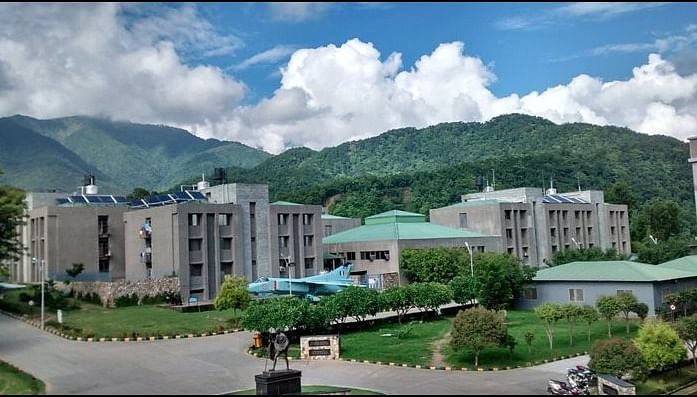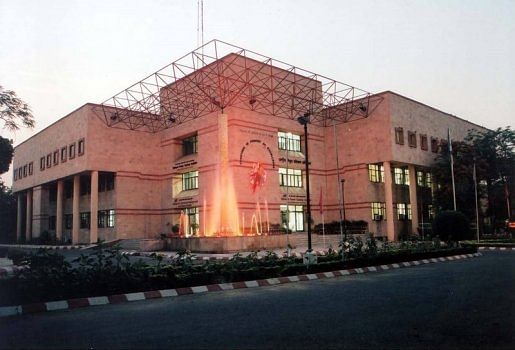MBA in Power Management Syllabus and Subjects

MBA in Power Management syllabus is divided into 4 semesters and integrates fundamental business concepts with topics in the energy sector. The MBA in Power Management syllabus covers essential areas such as Energy Economics, Sustainable Practices, Project Management, Regulatory Frameworks, and more. The program provides practical insights into energy operations and emerging industry trends such as grid modernization, big data in energy, blockchain in energy, etc.
MBA in Power Management equips students with expertise to enhance power-related processes across manufacturing, automotive, and retail sectors. Graduates of the MBA in Power Management are prepared for various roles, including Energy Manager, Project Coordinator, Regulatory Analyst, and Sustainability Consultant.
Table of Contents
Semester Wise MBA Power Management Syllabus
The MBA in Power Management syllabus includes a mix of core and elective subjects, with core courses laying a strong foundation in power management principles. Elective courses allow students to develop specialized expertise in specific areas of the power industry. Listed below is a breakdown of the syllabus for an MBA in Power Management syllabus offered across universities.
First-Year MBA in Power Management Syllabus
The first year of the MBA Power Management syllabus focuses on topics such as energy economics, power generation technologies, and project management. The year sets the groundwork for a comprehensive understanding of the power industry.
Detailed in the table below is a semester-wise breakdown of the MBA in Power Management syllabus for first-year:
|
Semester I |
Semester II |
|
Economics and Management Decisions |
Human Resource Management |
|
Financial Management |
Customer Relationship Management |
|
Marketing Management |
Project Management and Contract Administration |
|
Quantitative Techniques for Management Applications |
Strategic Management of Technology and Innovation |
|
Operations and Material Management |
Research Methodology |
Second-Year MBA in Power Management Syllabus
In the second year of the MBA in Power Management, students advance into topics like power plant operations, risk management, environmental impact, and strategic planning. The culmination of this year is a capstone project that allows students to apply their knowledge to real-world power industry challenges.
Listed below is a semester-wise MBA Power Management syllabus for the second year.
|
Semester III |
Semester IV |
|
Power Sector Economics and Planning |
Business Policy and Strategy |
|
Financing Energy Sector Projects |
Energy Law and Policy |
|
Power Pricing and Power Purchase Agreements |
Health, Safety and Environment for Power Industry |
|
Power Trading |
Dissertation |
|
Power Station Management |
- |
Practical Subjects in MBA Power Management Second Year Syllabus
Below mentioned are a few practical subjects covered in second year MBA in Power Management syllabus:
- Combined Cycle Gas Turbines (CCGT) Application
- Power Plant Operation and Maintenance
- Power Plant Engineering and Design
MBA in Power Management Subjects
MBA in Power Management subjects provides a sound understanding of various aspects of power management, such as energy economics and markets, renewable energy systems, the environmental impact of power generation, and so on. Listed below are some important subjects covered across institutions offering MBA in Power Management.
MBA in Power Management Core Subjects
Core subjects in an MBA in Power Management cover financial strategies, marketing for energy, HR dynamics, power systems, energy resources, economics, station operations, business policies, and legal frameworks, building a strong foundation for power management roles. Some of the core subjects included are:
- Financial Management
- Marketing Management
- Human Resource Management
- Power Sector Structure and Functioning
- Energy Resources
- Power Sector Economics and Planning
- Power Station Management
- Business Policy and Strategy
- Risk and Hazard Management
- Energy Law and Policy
MBA in Power Management Elective Subjects
Elective subjects in an MBA in Power Management enhance expertise in key areas of power industry specialization. Elective subjects include the following:
- Hydro Power Resources Management
- Renewable Energy
- Energy Conservation and Energy Audit
- Distribution Automation and Smart Grid
- Sustainability and Climate Change
- Global Power Business
- Security Analysis and Portfolio Management
MBA in Power Management Subjects in Detail
MBA in Power Management subjects include risk management, hydro resources, energy conservation, smart grids, sustainability, global power business, and security analysis. These subjects enhance expertise in key areas of power industry specialization. Listed below is a detailed overview of the subjects and the topics covered.
|
MBA in Power Management Subjects |
Topics Covered |
|
Economics and Management Decisions |
Concept and Nature of Management, Organisational Behaviour, Leading, Management Control, Managerial Economics, Managerial Decision-Making |
|
Management of Power Transmission and Distribution |
General Concept of Power System, Distribution System, Distribution Automation, Commercial Operations of a Distribution Utility, Metering & Billing, Revenue Collection, Emerging Trends in Metering Technology |
|
Power Station Management |
Management of Fuel, Water Resources, Electricity Demand Scenario, Performance Management, Statutory Requirements, Trained Manpower as per Environmental Regulations |
|
Risk and Hazard Management |
Risk: Rules and Regulations, Hazard Identification, Failure Modes, Consequence Analysis, Health and Risk Assessment |
|
Hydro Power Resource Management |
Hydro Power Development Planning, Hydrology, Contracting and Procurement, Engineering, General Layout, Construction Methods, Operation and Maintenance Principles |
|
Energy Conservation and Energy Audit |
Energy Conservation Act 2001, Strategy: Objectives and Implementation, Thermal Energy System, Electrical Energy System, Energy Management, Incentives for Energy Conservation |
|
Renewable Energy |
Renewable Energy: Sources and Key Elements, Solar Thermal Power, Biomass Power, Fuel Cell, Mini and Micro Hydel Projects, Social Considerations, Economics and Financing of Renewable Energy Systems |
College-Wise MBA in Power Management Syllabus
MBA in Power Management may differ between institutions. To get a comprehensive overview of the specific subjects covered, interested individuals can download the MBA Power Management syllabus PDF for 2023 from the university's official website. Listed below is a general outline of the MBA Power Management syllabus offered by reputable institutions
UPES, Dehradun MBA in Power Management Syllabus
UPES, Dehradun, provides a comprehensive MBA Power Management syllabus encompassing various aspects of the energy sector. From Power Sector Structure and Functioning to Energy Power Trading and Network Administration, this program equips students with expertise in Solar Power Development, Regulatory Frameworks, and Strategic Management.
Listed in the table below is a semester-wise breakdown of the MBA Power Management syllabus offered at UPES:
|
Semester I |
Semester II |
|
Quantitative Methods |
Operations and Materials Management |
|
Organizational Behaviour |
Human Resource Management |
|
Principles and Practices of Management |
Executive Communication |
|
Power Sector Structure and Functioning |
Solar Power Development and Management |
|
IT Applications in Power Sector |
Power Financial Management |
|
Power Industry Accounting |
Open Elective I |
|
Business Communication |
Project Management Lab |
|
Marketing Management |
Business Research Methods |
|
Power Generation and PSM |
Project Management and Contract Administration |
|
Power Transmission and Distribution |
Energy Power Trading and Network Administration |
|
Power Economics |
Regulatory Frameworks in the Power Sector |
| - |
Program Elective I |
| - |
Industrial Visits |
|
Semester III |
Semester IV |
|
Strategic Management |
Integrated Power Resources Management |
|
Fuel and Water Resource Management |
Power Sector Planning |
|
Power Pricing and Power Purchase Agreements |
Energy and Business Law |
|
Supply Chain and Logistics for Power Industry |
HSE for Power Industry |
|
Program Elective II |
Practical |
|
Summer Internship |
Dissertation II |
|
Executive Communication Pro |
- |
|
Wind and Alternative Sources of Energy |
- |
|
Energy Conservative and Audits |
- |
|
Financing Power Sector Projects |
- |
|
Open Elective II |
- |
|
Dissertation I |
- |
|
Program Elective I |
Program Elective II |
|
Hydro and Nuclear Power Resources Management |
Sustainability and Climate Change |
|
Green Transition and Smart Infrastructure |
Risk Management and Insurance |
|
Distribution Automation and Smart Grid |
Global Power Business |
MDU, Rohtak MBA Power Management Syllabus
Maharshi Dayanand University’s MBA Power Management syllabus is designed to empower individuals in the field of energy management. Covering topics like Energy Resources, Electricity Industry Regulations, and Integrated Energy Management, this program offers a holistic approach to power management.
Detailed in the table below is a semester-wise breakdown of the syllabus offered at MDU:
|
Semester I |
Semester II |
|
Management Concepts and Applications |
Financial Management |
|
Managerial Economics |
Marketing Management |
|
Organizational Behaviour |
Human Resource Management |
|
Quantitative Analysis |
Operations and Supply Chain Management |
|
Accounting for Managers |
Business Research Methods |
|
Business Communication Skills |
Operations Research |
|
Business Environment |
Electricity Industry Structure and Regulations |
|
Energy Resources, Conversions and Power Plant System |
Management of Power Transmission and Distribution |
|
Semester III |
Semester IV |
|
Strategic Management Concepts |
Basics of Entrepreneurship |
|
Management Information System |
E-Commerce |
|
Business Legislation Fundamentals |
Power Pricing and Power Purchase Agreements |
|
Power Environment Interface |
Integrated Energy Management and Power Planning |
|
Summer Training Report |
Project Report |
| - |
Viva voce |
MBA Power Management Project Topics
The curriculum for an MBA in Power Management course incorporates project works that aim to provide students with practical insights into various aspects of power management, allowing them to apply theoretical knowledge to real-world scenarios within the energy sector. Some project topics may include
- Analyze Efficiency Measures at a Solar Power Plant
- Study on Implementation of Energy-saving Techniques in a Manufacturing Facility
- Study on Regulatory Compliance in Wind Energy Projects
- Explore Sustainable Practices in Hydropower Generation
- Investigate Cost Management in Thermal Power Plants
- Assessing Grid Integration Challenges of Renewable Sources
- Evaluate Operational Strategies for Electric Vehicle Charging Networks
- Optimizing Maintenance Processes in Nuclear Power Facilities
MBA Power Management Course Structure
The MBA Power Management syllabus spans two years and is divided into four semesters, offering a holistic and immersive learning experience. The course structure of the program can be delineated as follows:
- Two years
- Four Semesters
- Core and Elective Subjects
- Projects
- Internship
- Dissertation/Capstone Project
MBA in Power Management Teaching Methodology and Techniques
The MBA in Power Management program employs a diverse range of instructional methodologies to cultivate practical experiences, enhance analytical thinking, and impart essential business insights for success in the dynamic field of power management. These include:
- Case Studies
- Guest Lectures
- Field Trips
- Group Projects
- Industrial Workshops
- Internships
- Research Projects
MBA Power Management Reference Books
Reference books for MBA in Power Management cover various aspects of the energy and power sector. They cover topics from energy economics, power management systems, environmental regulations, sustainability, and more. Listed in the table below are some reference books for students to refer to:
|
Subjects |
Books |
Authors |
|
Renewable Energy |
Biomass Energy Projects |
Louis J. Godman |
|
Customer Relationship Management |
The CRM Handbook |
Jill Dyche |
|
Energy Conservation and Audit |
Handbook of Industrial Energy Conservation |
S. David |
|
Hydro Power Resources Management |
Planning and Management of Hydro Resources |
Dr. B.S.K. Naidu |
|
Power Station Management |
Standard Plant Operators Manual |
Stephen Michael Elanka |
Top MBA in Power Management Colleges
Top Management Entrance Exams
MBA in Power Management Fee Structure
FAQs on MBA in Power Management Syllabus and Subjects
Q: What is the MBA in Power Management syllabus?
Q: What are the elective subjects in MBA Power Management course?
Q: What are the important research topics for MBA in Power Management dissertation?
Q: What are the MBA in Power Management subjects in the second year?
Q: What are the important books for MBA in Power Management course?






















